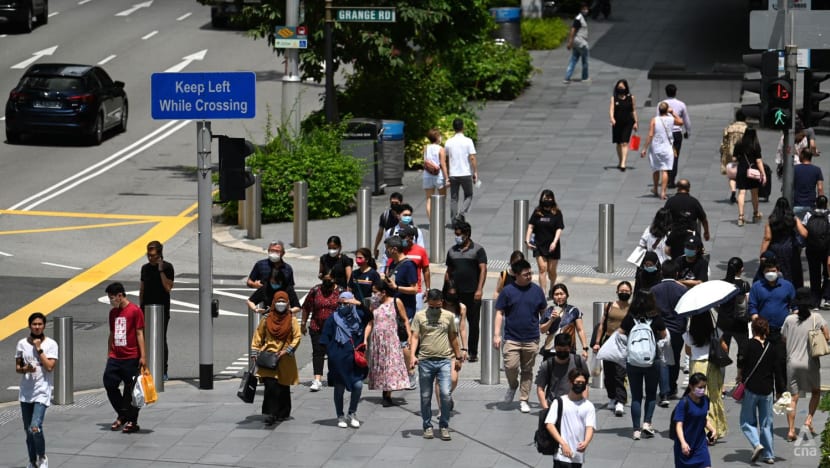Commentary: Is Singapore’s complaint culture helping us or hurting us?
Complaining is a double-edged sword that requires careful wielding, says NUS lecturer Jonathan Sim.

People are seen walking along Orchard Road in Singapore on Mar 29, 2022. (File photo: CNA/Marcus Mark Ramos)

This audio is generated by an AI tool.
SINGAPORE: How often have you heard someone refer to complaining as a “national pastime” in Singapore? Why do we complain and what do we get out of it?
While the Oxford Dictionary defines "complain" as an expression of dissatisfaction or annoyance about something, the philosopher, Julian Baggini, defines the term in his book Complaint as “a refusal or inability to accept that things are not as they ought to be”. This suggests that complaining is not intrinsically harmful - its impact really depends on how we use it.
So, is Singapore’s complaint culture helping us or hurting us?
COMPLAINING CAN HELP US CONNECT WITH OTHERS
Complaining can be a social act, a way for people to share and connect with others.
For instance, the air-conditioning in the MRT might have broken down, making everyone uncomfortable in this hot and humid weather. Yet, a light remark about how the train operator is offering everyone a free sauna on their way home can lighten the mood in the carriage, fostering a sense of a shared experience among strangers - that we are in this together, solidarity amongst fellow sufferers.

The growing popularity of complaint groups on social media in Singapore is not just a digital phenomenon - it is a testament to the socially unifying power of complaining. While some may deride these online complaints as trivial and pointless, users of such platforms find connection and validation of their feelings and experiences - that they are not alone or even crazy to think that there was something wrong with what they had experienced.
Nonetheless, this trend raises questions about our societal dynamics: What is motivating more individuals to air their complaints online? Are these online spaces becoming a substitute for tangible human connections? Are we witnessing an undercurrent of social isolation, or is it simply easier to bond over shared frustrations online?
And more intriguingly: Does the communal comfort in airing our complaints fuel a hunger to complain even more?
COMPLAINING CAN CRIPPLE US FROM ACTION
Regardless of what our motivations for complaining may be, we must be careful that this “national pastime” does not become a poison or an addiction.
The OneService municipal app, for example, receives 1.7 million complaints from Singapore residents every year - that’s more than 4,600 cases a day. Complaints range from issues about overflowing rubbish bins and illegal parking to noisy neighbours. During the COVID-19 pandemic, OneService earned the reputation of being the “pao toh” (Hokkien term for tattletale) app as residents used it to report people who were flouting safe distancing rules.
In Twilight Of The Idols, philosopher Friedrich Nietzsche warned that complaining can provide a false sense of satisfaction, perhaps even an “intoxicating sensation of power”. The problems that drive us to complain can also become sources of pleasure. We can grow addicted to it - and that ironically can prevent us from making any real change.
If we are not careful, the addictive satisfaction can make us habitual complainers.
The more we complain, the more we exercise our refusal to accept things for being less than perfect. This can grossly distort our perception, making us even less accepting of the imperfections in people and situations, no matter how excellent or wonderful they may be.
In October 2023, a woman was jailed and fined for various offences after making a ruckus in the Accident and Emergency Department of Singapore General Hospital, verbally abusing a nurse and even arguing with the police. She had become so absorbed by her complaints that it fuelled her rage, impairing her ability to assess the situation objectively. Things might have turned out differently if she had been a little more understanding and accepting of the situation she was in.
Not too long ago, I proposed a challenge to my friends: We were not allowed to complain in our conversations. Instead, we had to talk about the good things in our lives.
This turned out to be quite a difficult exercise for those of us in the habit of complaining. The first time we tried it, we gave up after a long period of silence. We could not think of anything good to talk about even though we did have some positive things going on in our lives.
I was disturbed by this experiment - it made me realise how much of an impact complaining could have on our perceptions, attitudes, and general outlook on life.
Fortunately, we can counteract the negative effects of habitual complaining. I consciously became more mindful of my words, cutting down on the need to complain, and instead tried to articulate more gratitude and appreciation of the little joys and victories that came my way.
It was difficult at first, but as the months went by, I found myself able to reclaim a more objective way of evaluating things - I could appreciate the good that people were doing, and while I still noticed imperfections and flaws, I stopped becoming irked or fixated by them. Interestingly, I found myself less irritated and generally happier as the weeks went by.
COMPLAINING CAN BE A POWERFUL FORCE FOR POSITIVE CHANGE
To be clear, I am not advocating that we give up complaining altogether and blindly accept everything that comes our way. Complaining is a powerful driving force for change in the world. Many of the modern conveniences we enjoy are borne out of the fruits of complaints that drove innovation and progress.
The key to unlocking the power of our complaints is in the framing. Blaming uncontrollable factors can make us feel powerless to act. I could blame society for making my life difficult. But this complaint does not open concrete pathways for action: How do I even begin changing society?
I could instead reframe my complaint to identify what exactly needs to be done to improve the situation. This way, our complaints can empower either ourselves or the relevant parties to make real action and change.
A good example of this is the homeowners in the new housing town of Tengah. They aired complaints about a myriad of issues clearly identifying specific problems, such as difficulties with transportation, a lack of amenities and food options in the area, poor cellular networks, and the prevalence of dust and mosquitoes in the estate.
Because these complaints clearly identified specific areas for improvement, the authorities have been able to introduce interim solutions like a mobile grocery truck, vending machines and a free bus shuttle service to serve residents while the long-term amenities and infrastructure are being built.
Their complaints became a force for good that brought positive changes for everyone in Tengah.
Complaining is a double-edged sword, one that requires careful wielding. Used constructively, it can foster connections and empower positive change in the world. Misused, it can cripple us and become an addictive habit that distorts our perception, fostering greater dissatisfaction.
In moments when we feel tempted to complain, it is worth asking ourselves: What is the purpose of this complaint? This introspection can guide us towards using our complaints productively as a force for good.
Jonathan Sim is Associate Fellow of the NUS Teaching Academy and Lecturer with the Department of Philosophy at National University of Singapore.




















